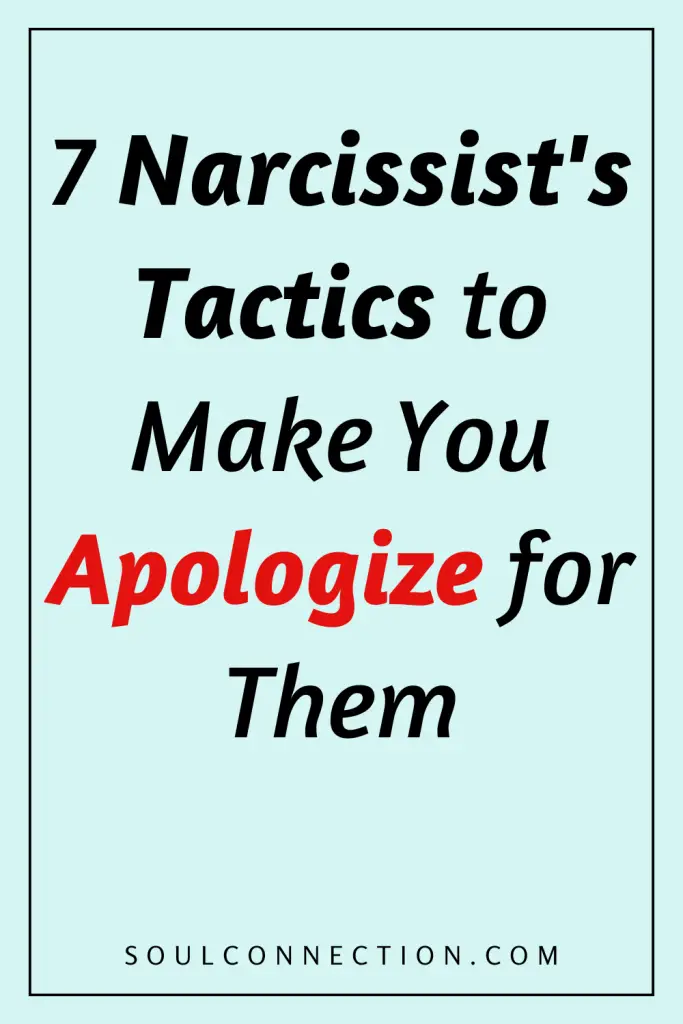Ever found yourself saying “I’m sorry” for something you didn’t even do? Or apologizing to your mother-in-law for your partner’s latest snub, while they stare blankly at the TV?
Welcome to the exhausting circus of apologizing on behalf of a narcissist.
If you’re reading this, you probably know the routine: you trip over yourself trying to keep the peace, while they’re off somewhere basking in their own reflection (figuratively, but let’s be honest—sometimes literally).
Let’s pull back the curtain and expose the greatest hits from the narcissist’s playbook—the sneaky moves they use to get you to take the fall.
Heads up: a little self-awareness and some new strategies can help you break free tonight (or at least before you find yourself apologizing for why the weather ruined their picnic).
1. Gaslighting Until You Can’t Tell Up From Down
Narcissists are the world heavyweight champions of reality distortion. One moment, you’re sure they forgot your anniversary—again. The next, they’ve spun the story so thoroughly, you’re apologizing for “getting upset over nothing.”
Gaslighting isn’t always dramatic. Sometimes it sounds like, “Wow, I never said that. Are you sure you’re not remembering wrong?” Or, “You’re always so sensitive; I was just joking.”
Before you know it, you’re questioning your memories, your sanity, and whether you’ve accidentally joined a secret improv troupe.
Spot the pattern: if you keep apologizing for feeling hurt, confused, or simply existing in the room during their blunders, you’re on the receiving end of a gaslight special.
The antidote? Keep receipts—mental notes, actual notes, whatever helps you stay clear on what’s real. When you’re grounded in your own reality, you’re much less likely to say sorry for theirs.
2. Playing the Helpless Victim (With a Side of Crocodile Tears)
When a narcissist’s behaviour finally catches up with them, watch them morph into the world’s saddest puppy. Suddenly, they’re fragile, misunderstood, and the real victim in a plot cooked up by cruel fate.
Now, who’s left to apologize for their “mistakes”? You, naturally. You smooth things over with friends, explain away their bad day, and maybe even bring them tea while they mope.
Here’s the trick: their helplessness is an act. It’s designed to trigger your empathy, or your guilt, or both. If you’re the only adult in the room, it’s tempting to fix everything. Resist!
Empathy is a beautiful thing, but don’t let it become your kryptonite.
Hand their apology back to them like a hot potato. “That’s between you and them, love. I’m not getting in the middle.” Watch what happens.
3. Spreading the Blame Like Butter on Hot Toast
Narcissists rarely meet a situation they can’t blame on someone else. They missed a deadline? Well, you distracted them. They insulted your friends? If only you’d chosen better ones!
This tactic is as subtle as a brick through a window: the narcissist’s behaviour is never about them, it’s always about the circumstances, the company, or (fingers pointed squarely at you) their “support system.”
Suddenly, you’re not just apologizing for their actions—you’re apologizing for failing to prevent them.
If you find yourself rehearsing apologies for things you couldn’t possibly influence, congratulations: you’re starring in someone else’s blame game.
The fix: learn to spot the buttering. Next time blame starts sliding your way, park it right back. “Interesting perspective, but your choices are your own.” Then pass the toast.
4. Mastering the Art of Selective Amnesia
A narcissist’s memory is a magical thing. They’ll recall every tiny slight you ever committed, but their own mistakes? Are you sure that ever happened? It’s like living with a walking, talking, full-body delete button.
This selective amnesia makes it almost impossible to hold them accountable. Instead, you’re caught in a loop of explaining, reminding, and—eventually—apologizing for “bringing up old stuff.”
This becomes especially infuriating during conflicts. The narcissist acts like this is the very first time you’ve mentioned the issue, or worse, that you’re making it up.
It’s enough to make anyone start second-guessing their own recollections.
Keep your cool. Document patterns if you need to—texts, emails, even a diary (bonus points for dramatic flair). The more you rely on facts, the less likely you are to end up apologizing for their conveniently foggy memory.
5. Turning the Tables with Emotional Blackmail
Emotional blackmail is a narcissist’s favourite party trick.
Suddenly, you’re not just dealing with their bad behaviour; you’re dealing with threats of withdrawal, icy silences, or melodramatic ultimatums. “If you really cared about me, you wouldn’t make such a big deal out of this.”
This puts you in a corner: apologize (again, for something you didn’t do) or risk being iced out for a week. Many people take the hit, wave the white flag, and offer up yet another apology to restore peace.
The problem is, peace from a narcissist is always conditional—a reward for compliance, not a real resolution.
Once you hand over one apology, you’ll be expected to offer another, and another, until you’re basically running a full-service Sorry Shop.
Break the cycle by calmly stating, “I care, but I can’t apologize for what isn’t mine.” If they stomp off, let them. You’re not responsible for managing their moods.
6. Recruiting Flying Monkeys for Backup
Narcissists aren’t content to fight their battles alone. Much like the Wicked Witch, they love to recruit “flying monkeys”—friends, family, or mutuals who get roped in to pressure you into apologizing for the narcissist’s behaviour.
These folks rarely know the full story. They’ve been primed with, “She’s just so sensitive,” or “He just doesn’t appreciate how hard I’m trying.”
Next thing you know, you’re getting texts from Aunt Carol about “why can’t you just apologize and move on?”
Resist the urge to defend yourself to everyone in the group chat. Instead, keep it simple: “That’s between me and [Narcissist’s Name], appreciate your concern.”
Flying monkeys lose their power when you don’t engage.
A bonus tip: notice who buys into the narcissist’s narrative. Trust your gut about who you confide in next time.
7. Love Bombing, Then Withholding Affection
This tactic is the whiplash special: one minute, you’re being showered with affection, the next, you’re left out in the cold. The message is clear—love and approval are conditional, and you’d better keep apologizing to earn them back.
After a blow-up, the narcissist might suddenly become the perfect partner. They’ll cook dinner, send you sweet messages, and even apologize—sort of.
But if you bring up their behaviour or fail to smooth things over with others, the affection dries up. Fast.
It doesn’t take long to connect the dots: to keep the good times rolling, you start apologizing for their behaviour, smoothing things over, and sweeping issues under the rug.
All roads lead back to “Sorry, everyone, they didn’t mean it.”
Want freedom from this boomerang effect? Start seeing love bombing for what it is. True affection isn’t doled out as a reward for compliance.
Hold your boundaries, even when you’re tempted by the sugar rush of their sudden attention.
Breaking the Cycle of Apologizing for a Narcissist
Spotting these tactics is the first step in snipping the apology apron strings. It’s not easy—narcissists are masterful, slippery, and often charming just when you’re ready to call it quits.
But there’s a certain power in seeing the game for what it is.
Try this tonight: when the urge bubbles up to apologize on their behalf, pause. Ask yourself, “Is this really my responsibility?” If not, let the silence stretch.
It might feel uncomfortable at first, but that’s just the sound of you reclaiming your own peace.
And if the narcissist turns up the pressure? Remember, you don’t have to play. Everyone makes mistakes, but only one person should be apologizing for each one.
Apologizing for someone else’s mess isn’t your job—it’s theirs. Pass the buck back where it belongs. Your sanity (and your dignity) will thank you.


